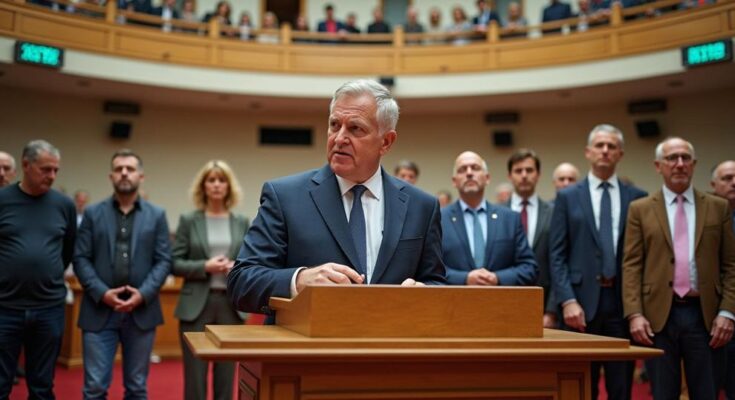Lithuanians are voting in parliamentary elections, signaling a desire for change as the current center-right administration faces strong opposition. Despite economic growth, public dissatisfaction due to COVID-19 management and migration issues complicate the political landscape, leading to potential coalitions as no single party is expected to dominate.
On Sunday, Lithuanians commenced voting in the first round of parliamentary elections, with potential implications for the governing center-right coalition headed by Prime Minister Ingrida Šimonytė. Opposition parties, particularly the Social Democrats and smaller center-left groups, are poised to challenge the current administration. Despite Lithuania’s robust economic performance, which includes double-digit increases in personal income and low inflation rates within the European Union, public sentiment is marked by disappointment. Political analyst Rima Urbonaitė notes widespread voter dissatisfaction, attributing it to multiple crises that transcend mere economic indicators such as improved purchasing power. Crits of Prime Minister Šimonytė’s government have emerged particularly regarding stringent COVID-19 restrictions, with many citizens feeling that there was insufficient governmental support for businesses during lockdowns and inadequate access to healthcare services. Furthermore, the government’s handling of the migrant situation—exacerbated by an influx of individuals from Belarus—has also drawn significant criticism. Recent polling data suggests that the Social Democratic Party, led by Vilija Blinkevičiūtė, is likely to secure the most votes, surpassing that of Šimonytė’s Homeland Union. Newer political entities, such as Nemuno Aušra—established by controversial politician Remigijus Žemaitaitis—are expected to place in the mix as well. However, given the projected results, no single party is anticipated to exceed 20 percent of the vote, compelling a coalition of several parties to form a government. Mr. Darius Mikalauskas, a lifelong conservative voter, expressed a shift in his intent this election, reflecting broader sentiments about the current administration: “Šimonytė and the entire Homeland Union looks battered, worn out and they would better spend some time on the spare bench”. Analysts emphasize that a leftward shift in governance is unlikely to substantially alter Lithuania’s foreign policy, especially under the influence of President Gitanas Nauseda, who has reinforced his leadership in the recent presidential election. With approximately 2.4 million citizens eligible to vote for 141 members of the parliament, this election could notably reshape the political landscape in Lithuania and will progress to a runoff election on October 27 for the leading candidates in single-member constituencies.
Lithuania is holding its parliamentary elections amid a backdrop of economic success contrasted with public dissatisfaction. Prime Minister Ingrida Šimonytė, who has led the government since 2020, is facing significant challenges from the opposition despite Lithuania’s economic growth and low inflation rates within the European context. The political landscape reflects a yearning for change, influenced by recent crises and the government’s handling of various domestic and international issues, including healthcare access during the pandemic and the migration influx from Belarus. The electoral outcome could determine the future direction of both domestic policy and Lithuania’s foreign relations, particularly concerning ongoing tensions with Russia.
In conclusion, Lithuania’s parliamentary elections represent a crucial juncture where public sentiment calls for change despite the prevailing economic stability. The emerging opposition, led by the Social Democrats, highlights a potential realignment in governance, which may not significantly affect foreign policy. This election is not only a measure of public discontent but also a critical response to the Šimonytė administration’s handling of contemporary issues such as the pandemic and migration, underscoring the complex dynamics within Lithuania’s political arena.
Original Source: www.pbs.org




